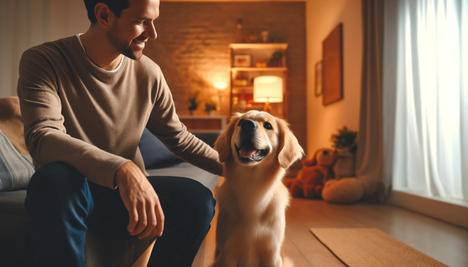Attribute "Not independent"

A loyal companion: what does "not independent" mean for a dog breed?
Dogs are not only our best friends, but also fascinating creatures with a variety of personalities and characteristics. One of these traits that comes up time and time again in certain dog breeds is the "not independent" trait. But what exactly does this mean and how does it affect living with your four-legged friend? In this article, we take a deep dive into the topic to explain everything you need to know.
What does 'not independent' mean?
'Not independent' refers to dogs that rely heavily on the guidance and closeness of their human. These dogs tend not to make decisions independently and prefer to rely on their owner for guidance. They are often very affectionate, people-oriented and constantly seek to be close to their human.
Typical characteristics of non-independent dogs
- Affectionate and people-oriented: These dogs follow you everywhere and always want to be near you.
- Obedient and easy to train: They are often very willing to obey commands and quickly learn what is expected of them.
- Constantly seeking reassurance: Non-independent dogs often look to their owner to see if they are doing something right or for approval.
- Separation anxiety: Due to their strong bond with their human, they can suffer from separation anxiety when left alone.
Advantages and disadvantages of a non-independent dog
Advantages
- Easier to train: Thanks to their high level of obedience and desire to please, these dogs are often easier to train.
- Strong bond: You will be able to build a very close relationship with your dog as they will always want to be near you.
- Ideal for beginners: Because of their willingness to follow instructions, they are often a good choice for people who don't have much experience with dogs.
Disadvantages
- Separation anxiety: The strong bond can cause the dog to have trouble staying alone, which can cause stress for both parties.
- Lack of independence: If you are looking for a dog that is independent and can keep itself busy, a non-independent breed may not be the best choice.
- High level of care: These dogs need a lot of attention and care, which can be time-consuming.
Dealing with a non-independent dog
Tips for training
- Consistency is key: A non-independent dog needs clear, consistent rules to know what is expected of them.
- Positive reinforcement: Reward good behavior with treats, pats or words of praise. This motivates your dog to continue to obey.
- Establish routines: Regular routines give your dog a sense of security and help him to orientate himself better.
Tips for everyday life
- Activities together: Do lots of things together, whether it's playing, going for a walk or simply cuddling on the sofa.
- Practice being alone: Practice being alone gradually to minimize separation anxiety. Start with short periods of time and gradually increase them.
- Mental exercise: Offer your dog mental challenges, such as puzzle toys or tricks, to keep him mentally fit.
Conclusion
Non-independent dogs are wonderful, loyal companions who seek a close relationship with their owner. They are ideal for people who want to invest a lot of time and attention in their relationship with their dog. With the right strategies, you can overcome the challenges and build a fulfilling, loving bond with your four-legged friend.





